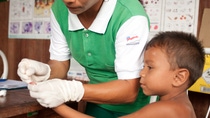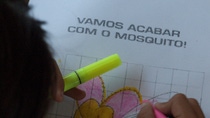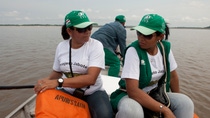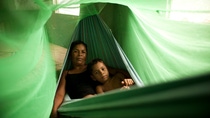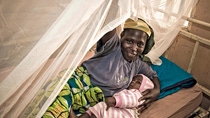Agriculture
Malaria control in the Amazon
Although African communities are under the greatest threat of malaria, the disease is a reality in many other developing countries. In some states in Brazil, particularly those located near the Amazon forest, malaria constitutes the major public health problem.

To better manage the risks of malaria transmission in the region, BASF partnered with Foundation for Health Surveillance in Amazonas (FVS - AM) to assess how Interceptor®, BASF’s long-lasting insecticidal bed net, could support local communities in their efforts to prevent the disease.
The community of Jabote (municipality of Urucara) was chosen to host the study because it is known as one of the major hotspots for malaria outbreaks. In Jabote, traditional prevention methods could not be easily applied, meaning that malaria had become as common as a cold.
The project started in late 2008: Interceptor nets were placed in all houses in Jabote. Residents were also coached on how to use the product and the purpose it served. From that point on, monthly monitoring revealed astonishing results: In 2007, when 132 people lived in the community, there were 465 cases of malaria. That translates to an infection rate of 3.52 cases per person, meaning that each person in Jabote contracted malaria at least three times a year. In 2010, with a population of 200 people, the rate of malaria was reduced to only 0.12 cases per capita. For every 12 people, only one acquired the disease.
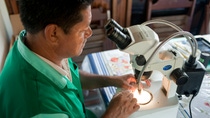
The positive effects spiralled throughout the community. The burden of malaria had prevented children from regularly attending school. But with the dramatic reduction in malaria cases, going to school was possible again. Literacy objectives were achieved in just two years. These effects typify one of the major targets of the United Nations Millennium Development Goals, namely that a healthier, more educated population is key to sustainably support poverty reduction.
Interceptor® is a result of BASF leadership both in textile chemistry and agricultural products. A polymer binder system is combined with Fendona®, a fast-acting BASF insecticide, and applied directly to the fibers of the nets in a unique, proprietary treatment process. This regulates a continuous, slow and controlled availability of the insecticide on the net surface and ensures long term effectiveness, knocking down and killing malaria-transmitting mosquitoes even after 3 years of use.
With its commitment to improving public health and its innovative portfolio of products, BASF is convinced that supporting and engaging in simple, local projects can bring life-changing results, like those experienced in Jabote. The goal is not only to prevent malaria from spreading, but also to fortify good ideas and initiatives that impact those most exposed to the disease. One step at a time.


